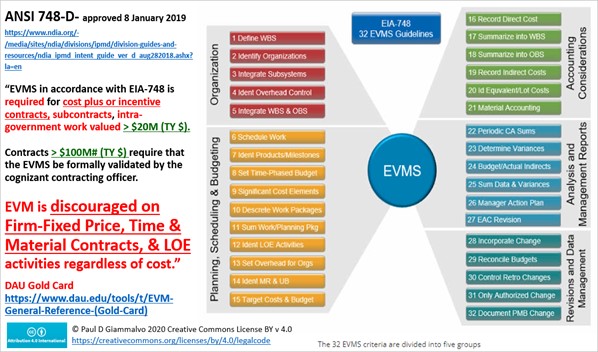Based on “Cost Engineering Principles”-
With Practical Case Studies for Validation Purposes
FEATURED PAPER
By Dr. Paul D. Giammalvo, CDT, CCE, MScPM, MRICS
Jakarta, Indonesia
INTRODUCTION
Two important papers, “It’s Time to “Reboot” Earned Value Management”[1] and “Planning for the Future of Earned Value Management,”[2] were recently published in the March issue of the Defense Acquisition University’s (DAU) blog.
In these well-written, well-documented papers, the authors summarized many years of relatively recent experience, both their own and that of others, telling us what, as taxpayers, we all knew intuitively, and that is “Earned Value Management” at least as practiced under ANSI 748 C or D has not worked, at least in the context of measuring and validating “value for money” by the US Governments stewardship of taxpayer funds. Specifically, one author posited that:
“Program leaders need to stop the bleeding and redirect budget resources when EVM analysis shows that progress is too slow, too expensive, and fails to meet performance goals or provide timely, reliable information.
This is a fundamental change in emphasis. The audit-like DoD compliance process is sclerotic. It is implemented by external specialists who lack detailed knowledge of the project and have no stake in the outcome.”
When someone with the gravitas of these authors and others from the DAU[3] tells us it is time to rethink Applied Earned Value Management, don’t you think we need to take his advice seriously?
Back around 2006, Brian Hobbs and Claude Besner published research showing that “Earned Value” was used “from limited to very limited use” and that “S-Curves and Statistical Process Control Charts” experienced “less than very limited use.”[4] This was also followed in 2006 in published research by Chance Reichel, who told us, “Unfortunately, it seems as if this phrase or title, “Earned Value Management,” is met and greeted with dread instead of the thought of usefulness.”[5] Other published research indicates that very few project managers used EVM, at least not as the US DoD advocated it in the Earned Value Management Systems Intent Guide (EIA-748-D Intent Guide.[6])
More recently, Millennial Ms. Shohreh Ghorbani reiterated these same observations in several of her 2021 postings on Linked In. It was also mentioned on at least one occasion by Patrick Weaver in his postings in 2021-22 and was also discussed on several occasions between Dr. Ken Smith, Colonel USAF (Ret), Andrew J. Grandage, Ph.D., Assistant Professor, Political Science, at the Public Affairs Department Western Carolina University and the author of this article during 2022. Meaning that there is a broad consensus that what we have been doing is not working, and as Henry Ford supposedly told us, “If you always do what you’ve always done, you will always get what you always got,” or Einstein, who told us “doing the same thing over and over again but expecting different results is the definition of insanity.”

Figure 1- EVM as the US Government (and PMI[7], AACE[8] et al.) advocate using it TODAY.[9], [10]
In recent months, at least one group of international EVM advocates have organized with the following objectives:
- To develop a message to convey EVM so that organizations will feel compelled to embrace it as a core business management practice.
- To devise a strategy to disseminate such a message globally and implement the strategy effectively using tested and PROVEN tactics.
This group and perhaps others appear to agree on at least two major questions:
More…
To read entire paper, click here
How to cite this paper: Giammalvo, P. D. (2023). Applied Earned Value Management Based on “Cost Engineering Principles”- With Practical Case Studies for Validation Purposes, PM World Journal, Vol. XII, Issue IV, April. Available online at https://pmworldjournal.com/wp-content/uploads/2023/04/pmwj128-Apr2023-Giammalvo-Applied-Earned-Value-Management-based-on-Cost-Engineering-Principles.pdf
About the Author

Dr. Paul D. Giammalvo, CDT, CCE, MScPM, MRICS
Jakarta, Indonesia
![]()
Dr. Paul D. Giammalvo, CDT, CCE (#1240), MScPM, MRICS, is a Senior Technical Advisor (Project Management) to PT Mitratata Citragraha. (PTMC), Jakarta, Indonesia. www.build-project-management-competency.com. He is noted for the development and delivery of graduate level, blended learning curricula designed for the mid-career path, English as Second Language (ESL) professionals to develop competency in the local practitioner and build capacity for the local organizations. For 25+ years, he has been developing and delivering Project Management training and consulting throughout South and Eastern Asia Pacific, the Middle East, West Africa, and Europe.
He is also active in the Global Project Management Community, by playing a “thought leadership” role for the Association for the Advancement of Cost Engineering International, (AACEI) http://www.aacei.org/ since 1991; He has also been active in two IPMA member organizations: The Green Project Management Association (GPM) http://www.greenprojectmanagement.org/ where he served on the Certification Board of Directors for two years and the American Society for the Advancement of Project Management http://www.asapm.org/ for which he served for four years on the BoD as Director of Marketing. He also sat on the Board of Directors of the Global Alliance for Project Performance Standards (GAPPS), www.globalpmstandards.org, Sydney, Australia and is active as a regional leader. Currently, he is a compensated consultant to the International Guild of Project Controls. http://www.planningplanet.com/guild as the primary author of their “Compendium and Reference” as well as the chief architect of their competency-based credentialing program. http://www.planningplanet.com/guild/certification
He has spent 35 of the last 50 years working on large, highly technical international projects, including such prestigious projects as the Alyeska Pipeline and the Distant Early Warning Site (DEW Line), upgrades in Alaska and the Negev Airbase Constructors, Ovda, Israel and the Minas Oil Field in Rumbai, Sumatra. His current client list includes Fortune 500 major telecommunications, oil, gas and mining companies plus the UN Projects Office and many other multi-national companies, NGO organizations and Indonesian Government Agencies.
In addition to 45+ years of hands-on field experience, Dr. Giammalvo holds an undergraduate degree in Construction Management, his Master of Science in Project Management through the George Washington University and was awarded his PhD in Project and Program Management through the Institute Superieur De Gestion Industrielle (ISGI) and Ecole Superieure De Commerce De Lille (ESC-Lille) under the supervision of Professor Christophe Bredillet. “Dr. PDG” can be contacted at pauldgphd@gmail.com.
To view other original work by Paul Giammalvo, visit his author showcase in the PM World Library at http://pmworldlibrary.net/authors/dr-paul-d-giammalvo/
[1] Abba, Wayne (2023) “It’s Time to “Reboot” Earned Value Management” Defense Acquisition University Blog https://www.dau.edu/library/defense-atl/blog/Reboot-Earned-Value-Management
[2] Reynolds, Chad (2023) https://www.dau.edu/library/defense-atl/blog/PlanningfortheFutureofEarnedValueManagement
[3] Reynolds, Chad (2023) https://www.dau.edu/library/defense-atl/blog/PlanningfortheFutureofEarnedValueManagement
[4] 1 Claude Besner, B. Hobbs (2006) The Perceived Value and Potential Contribution of Project Management Practices to Project Success
[5] Reichel, C. W. (2006). Earned value management systems (EVMS): “you too can do earned value management” Paper presented at PMI® Global Congress 2006—North America, Seattle, WA. Newtown Square, PA: Project Management Institute.
[6] NDIA (2018) “Earned Value Management Systems EIA-748-D Intent Guide” https://cupdf.com/document/earned-value-management-systems-eia-748-d-intent-guide.html?page=1
[7] Practice Standard for Earned Value Management – Second Edition (2011) https://www.pmi.org/pmbok-guide-standards/framework/earned-value-management-2nd
[8] AACE (2014) “RP 81-31- Required Skills & Knowledge for Earned Value Management”
https://www.pathlms.com/aace/courses/2928/documents/3864
[9] DAU Gold Card (2020) https://www.dau.edu/tools/t/EVM-General-Reference-(Gold-Card)
[10] Reichel, C. W. (2006). Earned value management systems (EVMS): “you too can do earned value management” Paper presented at PMI® Global Congress 2006—North America, Seattle, WA. Newtown Square, PA: Project Management Institute.









